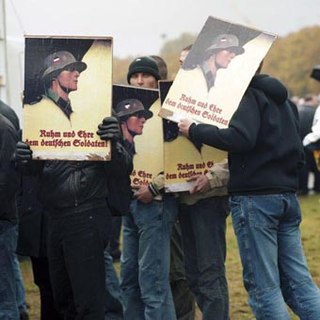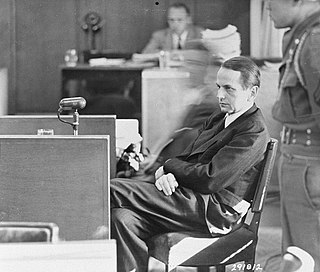
Germany is a democratic and federal parliamentary republic, where federal legislative power is vested in the Bundestag and the Bundesrat.

The Nuremberg trials were held by the Allies against representatives of the defeated Nazi Germany for plotting and carrying out invasions of other countries across Europe and atrocities against their citizens in World War II.

Denazification was an Allied initiative to rid German and Austrian society, culture, press, economy, judiciary, and politics of the Nazi ideology following the Second World War. It was carried out by removing those who had been Nazi Party or SS members from positions of power and influence, by disbanding or rendering impotent the organizations associated with Nazism, and by trying prominent Nazis for war crimes in the Nuremberg trials of 1946. The program of denazification was launched after the end of the war and was solidified by the Potsdam Agreement in August 1945. The term denazification was first coined as a legal term in 1943 by the U.S. Pentagon, intended to be applied in a narrow sense with reference to the post-war German legal system. However, it later took on a broader meaning.

Genocide denial is the attempt to deny or minimize the scale and severity of an instance of genocide. Denial is an integral part of genocide and includes the secret planning of genocide, propaganda while the genocide is going on, and destruction of evidence of mass killings. According to genocide researcher Gregory Stanton, denial "is among the surest indicators of further genocidal massacres".

Vergangenheitsbewältigung is a German compound noun describing processes that since the later 20th century have become key in the study of post-1945 German literature, society, and culture.

The Ministries Trial was the eleventh of the twelve trials for war crimes the U.S. authorities held in their occupation zone in Germany in Nuremberg after the end of World War II. These twelve trials were all held before U.S. military courts, not before the International Military Tribunal, but took place in the same rooms at the Palace of Justice. The twelve U.S. trials are collectively known as the "Subsequent Nuremberg Trials" or, more formally, as the "Trials of War Criminals before the Nuremberg Military Tribunals" (NMT).
Collective responsibility is the responsibility of organizations, groups and societies. Collective responsibility in the form of collective punishment is often used as a disciplinary measure in closed institutions, e.g. boarding schools, military units, prisons, psychiatric facilities, etc. The effectiveness and severity of this measure may vary greatly, but it often breeds distrust and isolation among their members. Historically, collective punishment is a sign of authoritarian tendencies in the institution or its home society.

The Reader is a novel by German law professor and judge Bernhard Schlink, published in Germany in 1995 and in the United States in 1997. The story is a parable, dealing with the difficulties post-war German generations have had comprehending the Holocaust; Ruth Franklin writes that it was aimed specifically at the generation Bertolt Brecht called the Nachgeborenen, those who came after. Like other novels in the genre of Vergangenheitsbewältigung, the struggle to come to terms with the past, The Reader explores how the post-war generations should approach the generation that took part in, or witnessed, the atrocities. These are the questions at the heart of Holocaust literature in the late 20th and early 21st century, as the victims and witnesses die and living memory fades.

Guenter Lewy is a German-born American author and political scientist who is a professor emeritus of political science at the University of Massachusetts Amherst. His works span several topics, but he is most often associated with his 1978 book on the Vietnam War, America in Vietnam, and several controversial works that deal with the applicability of the term genocide to various historical events, where Lewy denies both the Romani genocide and the Armenian genocide.
Harry Elmer Barnes was an American historian who, in his later years, was known for his historical revisionism and Holocaust denial.
Holocaust trivialization refers to any comparison or analogy that diminishes the scale and severity of the atrocities that were carried out by Nazi Germany during the Holocaust. The Wiesel Commission defined trivialization as the abusive use of comparisons with the aim of minimizing the Holocaust and banalizing its atrocities. Originally, holocaust meant a type of sacrifice that is completely burnt to ashes; starting from the late 19th century, it started to denote extensive destruction of a group, usually people or animals. The 1915 Armenian genocide was described as a "holocaust" by contemporary observers.
The Stuttgart Declaration of Guilt was a declaration issued on October 19, 1945, by the Council of the Protestant Church in Germany, in which it confessed guilt for its inadequacies in opposition to the Nazis and the Third Reich.
According to the double genocide theory, two genocides of equal severity occurred in Eastern Europe: the Holocaust against Jews perpetrated by Nazi Germany and a second genocide by the Soviet Union. The theory first became popular in post-Soviet Lithuania, in discussions about the Holocaust in Lithuania. A more explicitly antisemitic version of the theory accuses Jews of complicity in Soviet repression and characterizes local participation in the Holocaust as retaliation, especially in Lithuania, eastern Poland, and northern Romania. Double genocide theory has been criticized by scholars as a form of Holocaust trivialization.
A Mitläufer is a person tied to or passively sympathising with certain social movements, often to those that are prevalent, controversial or radical. In English, the term was most commonly used after World War II, during the denazification hearings in West Germany, to refer to people who were not charged with Nazi crimes but whose involvement with the Nazi Party was considered so significant that they could not be exonerated for the crimes of the Nazi regime.

The German War: A Nation Under Arms, 1939-1945 is a non-fiction book written by historian Nicholas Stargardt. Centering upon the "thoughts and actions" of the citizens living inside Nazi Germany during the Second World War, the author argues that the war crimes committed by Adolf Hitler's totalitarian state had widespread awareness among regular people. Despite massive hardship, those citizens continued to fight in support of fascist ideology even when their cause appeared truly lost. Much of the moral callousness arose due to the fallout from the First World War, which impacted regular Germans' lives deeply, yet the far-right dictatorship had fundamentally managed a successful propaganda machine that brought mass public opinion onto the side of the regime.

The myth of the clean Wehrmacht is the negationist notion that the regular German armed forces were not involved in the Holocaust or other war crimes during World War II. The myth, heavily promoted by German authors and military personnel after World War II, completely denies the culpability of the German military command in the planning and perpetration of war crimes. Even where the perpetration of war crimes and the waging of an extermination campaign, particularly in the Soviet Union – where the Nazis viewed the population as "sub-humans" ruled by "Jewish Bolshevik" conspirators – has been acknowledged, they are ascribed to the "Party soldiers corps", the Schutzstaffel (SS), but not the regular German military.

The victim theory, encapsulated in the slogan "Austria – the Nazis' first victim", was the 1949–1988 Austrian ideological basis formed by Austrians themselves under Allied occupation and independent Second Austrian Republic. According to the founders of the Second Austrian Republic, the 1938 Anschluss was an act of military aggression by the Third Reich. Austrian statehood had been interrupted and therefore the newly revived Austria of 1945 could not and should not be considered responsible for the Nazis' crimes in any way. The "victim theory" that had formed by 1949 insisted that all of the Austrians, including those who strongly supported Adolf Hitler, had been unwilling victims of the Nazi regime and were therefore not responsible for its crimes.

Comparisons between Israel and Nazi Germany occur frequently in some veins of anti-Zionism in relation to the Israeli–Palestinian conflict. The legitimacy of these comparisons and their potential antisemitic nature is a matter of debate. Historically, figures like historian Arnold J. Toynbee have drawn parallels between Zionism and Nazism, a stance he maintained despite criticism. Scholar David Feldman suggests these comparisons are often rhetorical tools without specific antisemitic intent. The Anti-Defamation League (ADL) sees them as diminishing the Holocaust's significance.
The Nazis and Nazi Collaborators (Punishment) Law is a 1950 Israeli law passed by the First Knesset that provides a legal framework for the prosecution of crimes against Jews and other persecuted people committed in Nazi Germany, German-occupied Europe, or territory under the control of another Axis power between 1933 and 1945. The law's primary target was Jewish Holocaust survivors alleged to have collaborated with the Nazis, in particular prisoner functionaries ("kapos") and the Jewish Ghetto Police. It was motivated by the anger of survivors against perceived collaborators and a desire to "purify" the community.

Genocide justification is the claim that a genocide is morally excusable/defensible, necessary, and/or sanctioned by law. Genocide justification differs from genocide denial, which is the attempt to reject the occurrence of genocide. Perpetrators often claim that genocide victims presented a serious threat, justifying their actions by stating it was legitimate self-defense of a nation or state. According to modern international criminal law, there can be no excuse for genocide. Genocide is often camouflaged as military activity against combatants, and the distinction between denial and justification is often blurred.













